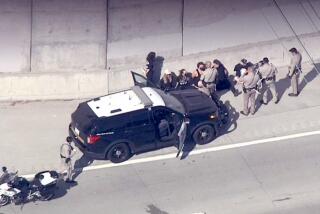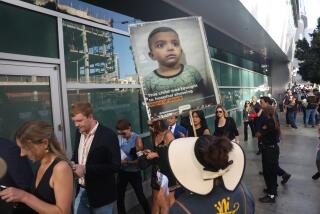For Protesters, a Fight for Curb Space
As emotions mount over a likely U.S. attack on Iraq, a battle of another sort has been taking shape at major intersections in Orange County over curbside turf.
Antiwar protesters, looking for highly visible locations to express their displeasure over the Bush administration’s push for war, were the first to lay claim to choice corners such as Anton Boulevard and Bristol Street across from Costa Mesa’s South Coast Plaza; Brea Boulevard and Imperial Highway in Brea; the traffic circle in Orange; and along Coast Highway at Broadway in Laguna Beach.
There, they position themselves with signs bearing slogans such as “No War for Oil” and “Drop Bush, Not Bombs.”
For months, antiwar protesters have gathered almost every weekend at the Brea intersection. Recently, however, people whom protester Joseph M. Siddiq calls “pro-Bush” have started showing up, often sharing the corner.
“There’s a lot of pressure in the country to go with the flow and get into a war,” said Troy Pickard, 20, a senior at Chapman University in Orange and a member of the antiwar Orange County Student Alliance, which has participated in demonstrations countywide, including the recent student walkout.
“People say you need to support our president, and that makes me wonder,” Pickard said. “I ask those people, ‘Would you support the president no matter what he says? What if he wants to revert back to slavery?’ ”
Both camps have opted for peaceful coexistence, but earlier this month, the curbside atmosphere was different. On one day, more than 250 people on flip sides of the ideological coin converged at the Brea intersection, which fast became ground zero for public disagreement over Iraq.
They called each other names. They jostled for position. They stood in front of each other, blocking signs. To counter such tactics, some got larger signs and bigger American flags, and in one confrontation a shoving match ensued that resulted in a man getting knocked to the ground but not hurt.
Motorists have complained the signs are a distraction, and that some of the demonstrators step off the curbs and cause a traffic nuisance, police said.
“Up to now, we’ve had no major problems,” said Brea Police Sgt. Jack Conklin, who acknowledged that officers monitor the intersection and help defuse tension. “We’ve had a contingent of antiwar demonstrators, and lately, after March 1, we’ve had a contingent of pro-Bush and pro-military people.”
What has occurred is an interesting microcosm of a larger “issue cleavage” in Orange County, said Fred Smoller, head of the Henley Social Science Research Center at Chapman University.
“Usually it’s rich versus poor, left versus right,” Smoller said. He added that in Orange County there are now many divisions, such as old conservatives and libertarians against the neoconservatives.
On Sunday, John Mynes, 62, of Brea stood at the Brea intersection opposite the antiwar people. On Mynes’ corner, demonstrators held American flags and signs that read “God Bless Our Troops.”
Despite the tense atmosphere, Mynes said he believes the ideological lines are somewhat blurred.
“We’re pro-peace. We’re just supporting our troops. We’re not supporting a war,” he said as some passing drivers honked their horns in agreement.
He said he would be among the first to fight for the right of antiwar demonstrators to express themselves. “That’s the beauty of this country,” he said.
His son, Christopher, 29, was among the first to wave an American flag at rallies at the intersection.
The younger Mynes said he was motivated to counter antiwar protesters because he wanted to honor the memory of POWs, some of whom had lectured at his high school history class.
“I got upset at seeing their signs and hearing what they were shouting to motorists, so I decided to demonstrate,” he said.
Louise Ross, 60, whose son Chuck, 25, is a sergeant in the U.S. Marine reserves stationed in Kuwait, said she kept seeing young Mynes standing at the busy intersection on Saturdays by himself.
“He inspired me,” she said, holding a sign that read “Don’t Want War but Need to Support Our Troops.”
“I could be on the other side of the street, but I preferred giving a more uplifting message about our troops,” Ross said.
More to Read
Sign up for Essential California
The most important California stories and recommendations in your inbox every morning.
You may occasionally receive promotional content from the Los Angeles Times.










